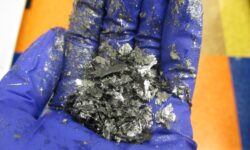TestOil, the industry leader in lubricant analysis, is one of a very few oil analysis providers offering Material Identification Analysis. This is a critical test for characterizing unexpected solid debris found in a filter or machine. This can help with root cause analysis--what may have caused the debris to be deposited. Determining the root cause of the issue, so that it can be resolved, can reduce costs associated with problem recurrence, such as unexpected downtime, increased filter changes, and shortened oil life.
While Filter Debris Analysis (another TestOil Service) detects wear metals, Material Identification Analysis detects both organic and non-organic materials. The analysis consists of a full range of analytical and sample preparation techniques to assess the origin of the material and provide recommendations for resolution.
The
following real life TestOil client examples illustrate the importance of this
service.
• A wax-based product was being used to coat aluminum parts. The product was
melted and held in a tank before being applied to the parts via hoses and
applicator blades. The applicator blades were frequently developing clogs,
resulting in uneven coating of the parts. Analysis revealed that the product
had been contaminated with calcium carbonate.
• The suction screen filter of a single-use lubricating system was coated with a black material. TestOil determined that the black material was primarily polypropylene rubber, and that the rubber hose through which the lubricant was being pumped was not compatible with the lubricant.
• During routine oil analysis, TestOil’s analysts noticed a gearbox lubricant sample containing a pink gel-like substance, black rubber-like particles, and hard white particles. These foreign contaminants were identified as grease, silicone rubber, and phenoxy resin.
• After a tractor had undergone its third hydraulic replacement, the maintenance crew decided to have a sample of odd-colored sludge analyzed. Testing was able to determine that the hydraulics had been severely contaminated with fertilizer due to the presence of compounds such as urea, nitrates and phosphates.
• A filter covered in dark brown sludge from an EHC hydraulic system was clogging frequently. TestOil determined that the dark brown sludge was the result of the phosphate ester fluid severely degrading in the presence of water.
TestOil President Mary Messuti said, “In all of these instances, the analysis allowed the client to take specific action that resolved the issue. Not every oil analysis lab provides this service because it requires a degree of expertise that most labs just don’t have on staff. TestOil analysts do have the expertise and the determination to get to the root cause of issues before they harm or destroy the equipment. “
For a detailed overview, watch TestOil’s Material Identification Analysis Webinar.
With more than 30 years of experience in the oil analysis industry and offering international shipping, TestOil focuses exclusively on assisting industrial facilities with reducing maintenance costs and avoiding unexpected downtime through oil analysis program implementation. As industry experts in diagnosing oil-related issues in equipment such as turbines, hydraulics, gearboxes, pumps, compressors and diesel generators, TestOil provides customers with a guarantee of same-day turnaround on all routine testing. With in-house, certified training professionals, TestOil offers lubrication and oil analysis training, private onsite training, certification training and exams, and educational webinars. For more information on partnering with TestOil on oil analysis programs or training opportunities visit www.testoil.com. Contact: 216-251-2510; sales@testoil.com.



